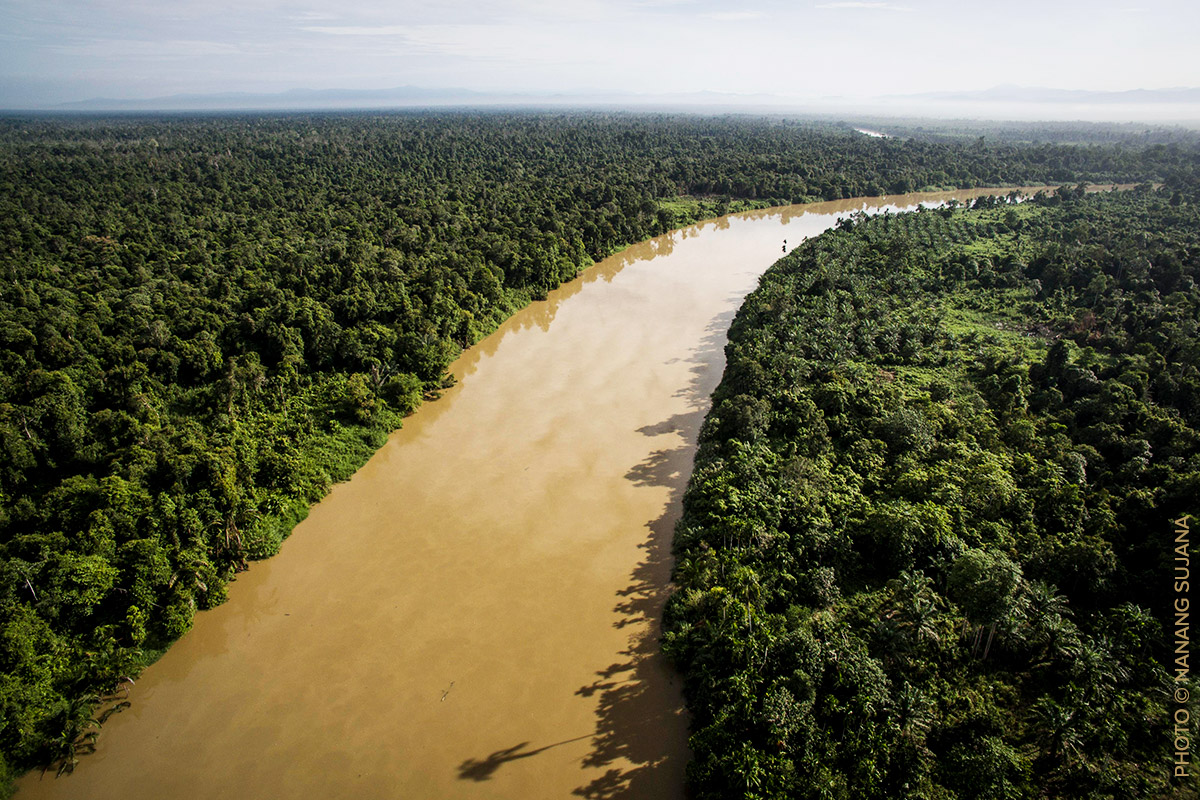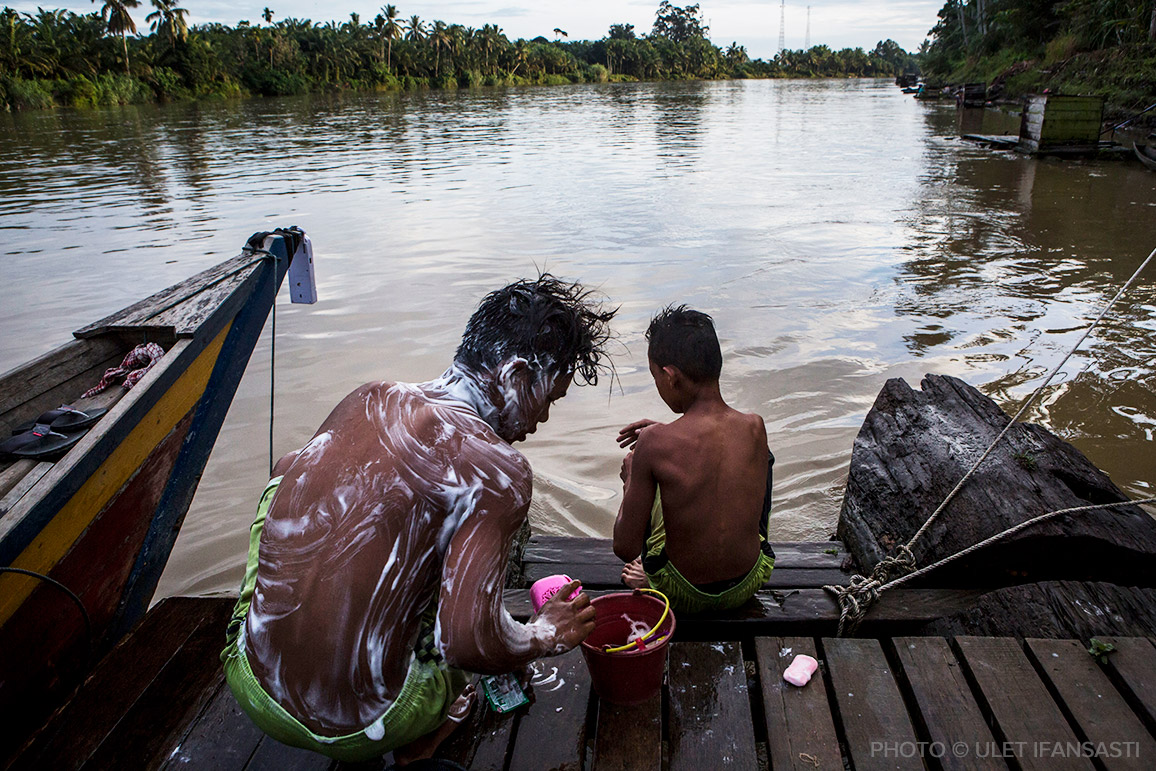Recent Leuser Watch posts have documented illegal palm oil production and other scandals involving Conflict Palm Oil being sourced by major brands from within the ecologically important, carbon-rich lowland rainforests and peatlands of the Leuser Ecosystem’s Singkil-Bengkung region in Sumatra. But it’s not just orangutans, tigers, rhinos and elephants who depend on this special region for survival. Tens of thousands of people depend on these intact forests too, and the area is rife with looming threats and unresolved conflicts between local communities and rogue palm oil plantation operators.
In addition to land conflicts, the expansion of palm oil plantation companies into the district of Aceh Singkil has harmed community livelihoods by damaging local resources, including agricultural land such as rice fields, and has brought terror, intimidation and criminalization into the lives of local community members.
Downstream Threats from Deforestation
The adjacent lowland rainforests which connect the Singkil and Kluet peatlands, and the rivers that run through them, play a crucial role in maintaining the ecological integrity of the Singkil-Bengkung watershed, upon which many local communities depend. The Singkil watershed covers 1,388,488 hectares in the provinces of Aceh and North Sumatra.

Peatland forests are unique wetland ecosystems capable of absorbing and then slowly releasing tremendous quantities of water in lush tropical climates like the one found on the west coast of Sumatra. When peatlands are drained and deforested, it exposes surrounding communities to major threats of catastrophic flash flooding, a man-made disaster that has become all too common in regions of Indonesia that have been developed for palm oil.
The scale and stakes of the problem are huge, it has become common for dozens to hundreds of people to be killed and thousands to be pushed from their homes across Indonesia each year from landslides and flooding connected to unchecked forest destruction upstream. In one instance alone this past April, 2019, over 30 people lost their lives and thousands were forced to flee their homes in the Bengkulu region of western Sumatra.
Deforesting the area risks permanently damaging the flow and quality of water that runs out of the mountains and through the Singkil-Bengkung region. Of equal concern to local communities are the changes in the hydrological function of the peatlands that results in the flooding of community lands in the rainy season and water shortages in the dry season.
Local communities depend on the lands and rivers of the Singkil-Bengkung region for their livelihoods. The local communities in Buluh Seuma, Aceh Selatan, traditionally harvest wild honey from inside the reserve, and the traditional use of non-timber products is common. Traditional use of forests is complemented by small-scale agriculture and gardens growing fruits and vegetables as sources of livelihood, including groundnut, jengkol, sweet potato, durian, banana, and corn.

Naming Names: A History of Controversial Companies in Singkil-Bengkung
The unchecked expansion of industrial palm oil plantations into areas where people are already established, often for generations, has caused thousands of unresolved land conflicts across Indonesia. The palm oil plantations established in Singkil-Bengkung region are an example of a systematic failure to respect customary rights, and to resolve conflicts between communities and companies arising from development on lands without consent being given by communities in the initial stages of the development.
PT. Asdal Prima Lestari: For over a decade, the lands used by local palm oil producer PT. Asdal Prima Lestari for its plantations have been contested, as they are the customary lands of local communities. Reports published by Walhi Aceh state that since the company seized the lands to establish its plantation, local communities have called on the district government to recognize their customary rights and stop further encroachment onto the lands and gardens occupied by three villages. These villages are now forced to occupy only a fraction of their customary lands and suffer the impacts of living next to a massive palm oil plantation.
On January 2016, hundreds of community members from villages of Kapai Sesak Alue Bujok and Titie Poben held a demonstration stating that they were ready to die to reclaim their land, which is the source of their livelihoods.
There are also reports that PT. Asdal has used intimidation and criminalization of local community members to frighten communities from taking any further action to demand recognition of their rights. The Aceh Singkil District Police have arrested four community members at community demonstrations that happened in Lae Langge Village.
PT. Nafasindo: PT. Nafasindo, a palm oil producer and mill operator, has also seized nearly 2000 hectares of community lands for palm oil development, despite active opposition from communities. In 2011, the company refused the instructions of the former Governor of Aceh to return the lands to the communities, reach agreement on boundary modifications, and deliver compensation for the harm it has caused. Instead, the company took the matter to the local courts, causing demonstrations from representatives of the local communities and students who participated in advocating for land justice.
In 2012, Aceh National Land Agency demarcated a permanent boundary that was disputed by local communities who were excluded from the boundary demarking process. The boundaries negotiated between the National Land Agency and the company were different from those recognized and agreed by the former governor. Around 100 farmers have been arrested and in some cases detained by police and imprisoned and later relocated. Some villagers faced time in prison and after their release continued to fight to regain their rights. Finally, in 2016, PT. Nafasindo released 347.4 hectares (Ha) of disputed land to 22 villages. This negotiated outcome did not fully restore the rights of local communities to their customary lands, but it was agreed as a way to move forward and secure some level of economic stability for local communities.
PT. Delima Makmur: This palm oil producer and mill operator also has a controversial track record since it seized lands that were managed by local communities for generations. Analysis conducted by LBH Banda Aceh identified two cases of land conflicts between local communities and PT Delima Makmur. The first land conflict case was with the Telaga Bakti Village, where over 50 community members sued the company and won a court decision for 200 hectares of their lands to be given back to the community following a court decision issued by the Singkil District Court. To date, the implementation of the court’s decision has still not been realized and the community continues to be unable to work their lands.
The second land conflict case with the Telaga Bakti Village and PT. Delima Makmur has arisen from the companies expansion of its palm oil plantation onto lands outside of its permitted area. Late last year, over 2500 hectares of oil palm was confiscated by the Regional Police as evidence and three directors of PT. Delima Makmur were named as responsible for illegal use of lands.
PT. Delima Makmur is controlled by Tesoro Holdings, a company represented by well-known actors in the palm oil industry in Aceh and North Sumatra and connected to Ibris Palm––the parent company of PT. Sisirau, which was expelled from the Roundtable on Sustainable Palm Oil (RSPO) in 2016 for the destruction of orangutan habitat in the Leuser Ecosystem.
Independent Investigations Into Land Conflicts Needed
A balance must be found between rebuilding the economy and equitable development while protecting human rights and the ecosystem services that local communities rely on for their livelihoods in the Singkil-Bengkung region. Unilever, Nestlé, PepsiCo, Mondelēz, General Mills, Kellogg’s, Mars and Hershey’s––the companies exposed for their connections to the destruction of the Singkil-Bengkung region––must expand their investigations to verify these violations of their requirements for suppliers to respect the rights of Indigenous Peoples and forest-dependent communities to give or withhold their Free, Prior and Informed Consent to palm oil development on their lands.
RAN is demanding that all companies sourcing from PT. Asdal Prima Lestari, PT. Nafasindo and PT. Delima Makmur must require the resolution of ongoing conflicts with local communities as a matter of urgency. If any company refuses to participate in independent investigations, credible conflict resolution processes, or fails to return customary lands to communities and fully implement negotiated agreements they should be placed on a permanent “No Buy” list.
Endnotes
BPDAS 2015.
Antara News, 2016
https://aceh.antaranews.com/berita/28323/ratusan-masyarakat-aceh-selatan-demo-pt-asdal
Tribun-Medan.com, 2011
https://medan.tribunnews.com/2011/05/03/demo-mahasiswa-ke-ptun-memanas
Letter No. 455 / 18.11.600 / IV / 2012.
Letter No.125 / KANDIR / X / 2014 dated 13 October 2014
AJNN.news, 2018
http://www.ajnn.net/news/2-576-hektare-lahan-pt-delima-makmur-disita/index.html
KBA.one, 2017
https://www.kba.one/news/polisi-izinkan-tersangka-pembakar-pt-asdal-dijenguk/index.html
